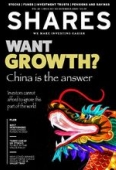Archived article
Please note that tax, investment, pension and ISA rules can change and the information and any views contained in this article may now be inaccurate.
Three funds to play a rally in US value stocks

The US stock markets may be associated with big tech names that are an integral part of our lives but in 2021 it could be the historically unloved and beaten down shares that become the stars of the show.
According to Bank of America, the first three weeks of November saw the second highest inflow ever into value stocks, ahead of a new year which is set to be all about vaccines not viruses and reopening not lockdown.
It expects US GDP to rise by 4.5% in 2021, the country’s best economic growth since 1999. It sees commodities, commercial real estate, small and mid-caps, and value stocks as the ones to outperform.

Fund managers at Janus Henderson also believe there will be a pronounced rotation into value stocks. Portfolio manager Jonathan Coleman believes the flow of good news on coronavirus vaccines and therapeutics will mean ‘factors dominating the market like momentum and extreme growth will break down’, with the reopening of the physical economy set to spark investors’ increased interest in value stocks.
Janus Henderson all-cap growth manager Doug Rao says one sector that will benefit next year is travel and leisure. He explains: ‘There’s an innate need to travel, and this pent-up demand is just building up by the day. We see a prolonged period of growth ahead for the travel and leisure industry.’
‘DON’T GO FULL-ON INTO VALUE’
Fund management giant BlackRock is also a fan of American stocks for 2021, expecting US equities to benefit from both structural growth trends and a potential cyclical upswing.
But it cautions against going full-on into value and believe this is not an either/or question between value and growth, instead advocating a barbell strategy that includes allocations on one side to quality companies benefitting from structural growth trends, and on the other to selected cyclical exposures. The asset manager says this can help achieve greater portfolio resilience amid still high levels of uncertainty about vaccine deployment.
Like the fund managers at Janus Henderson, BlackRock also thinks both fiscal and monetary policy support is ‘still a crucial bridge’ for the stock market before the roll-out of effective vaccines.
But on this point, it cautions that the risks of policy fatigue are rising. The US Treasury’s decision to end several emergency lending programmes has highlighted the risk of fading fiscal support, even though for now the action may pose only limited risks to financial stability and credit availability, and the Fed could extend lending facilities if needed. A Biden administration could be constrained in implementing its key policy plans including large fiscal spending.
HOW TO PLAY THE VALUE ROTATION
So how can investors play this recovery in 2021 and the rotation into value? From a fund perspective, investors could consider an exchange-traded fund which tracks a basket of value stocks.
Whenever value comes back into fashion across the pond, analysts and commentators on Wall Street typically focus on the FTSE Russell 1000 Value index, which captures the top 1,000 – and 90% of the market cap – of the FTSE Russell 3000 index.
After the Pfizer vaccine announcement on 9 November, the Russell 1000 Value index outperformed the Russell 1000 Growth index by 6%, the highest daily excess return over the past decade. The former index also captures more value stocks than oft-used MSCI USA Value Index, with 849 holdings compared to 412 for the MSCI.
To play this theme, we suggest you buy Lyxor Russell 1000 Value ETF (RSVL), which has an annual ongoing cost of 0.19%. The top holdings include Warren Buffett’s investment vehicle Berkshire Hathaway and consumer health products group Johnson & Johnson.


The increased diversification on offer has seen it outperform another US value ETF, the iShares Edge MSCI USA Value (IUVF) by 2.4% so far this year, returning -1.8% versus -4.2% for IUVF. Performance has notably been picking up in the past month as value comes back into fashion.
In actively managed space, income funds might be interesting as dividend-paying companies tend to be more in the value bracket compared to fast growing companies which typically do not pay generous dividends, if at all.
JP Morgan US Equity Income (B3FJQ59) could do well when value is in fashion, with more than a fifth of the portfolio in financials which is very much a value sector. It yields 2.5%.
There aren’t many specific US-focused value funds available to UK investors, but of the select few we suggest you consider MFS Meridian US Value (B08N668), which manages more than $1.5 billion of investors’ money.
Value is generally seen as a long-term game with some ideas taking a long time to play out, and this is something the managers of the Meridian fund take to heart with an average holding period of seven years and a third of the portfolio held for over 10 years. The fund has still delivered a good return in the meantime, with a five-year annualised return of 11.04%. Its ongoing costs are 0.83% a year.
Important information:
These articles are provided by Shares magazine which is published by AJ Bell Media, a part of AJ Bell. Shares is not written by AJ Bell.
Shares is provided for your general information and use and is not a personal recommendation to invest. It is not intended to be relied upon by you in making or not making any investment decisions. The investments referred to in these articles will not be suitable for all investors. If in doubt please seek appropriate independent financial advice.
Investors acting on the information in these articles do so at their own risk and AJ Bell Media and its staff do not accept liability for losses suffered by investors as a result of their investment decisions.
Issue contents
Editor's View
First-time Investor
Great Ideas
- 122% in four months: This stunning run for The Panoply should continue
- Primark owner Associated British Foods is well placed for a recovery
- Aviva chief delivers on promise to add shareholder value
- Big transactions at Pets at Home following first half results
- Cheap access to a hot style with a 4.9% yield
Money Matters
News
- Investors warned of tracker flip risk ahead of Tesla’s S&P 500 entry
- Here’s why gold has sold off, copper has rallied and oil remains volatile
- Hipgnosis benefits from change in valuation method
- The companies eyeing Arcadia assets after collapse
- Kingspan ESG credentials clouded by Grenfell inquiry
- Life sciences industry veteran David Evans launches new investment company
- Consequences of the pound rally on certain UK stocks
- Fabric coating Covid killer HeiQ to join UK stock market

 magazine
magazine








